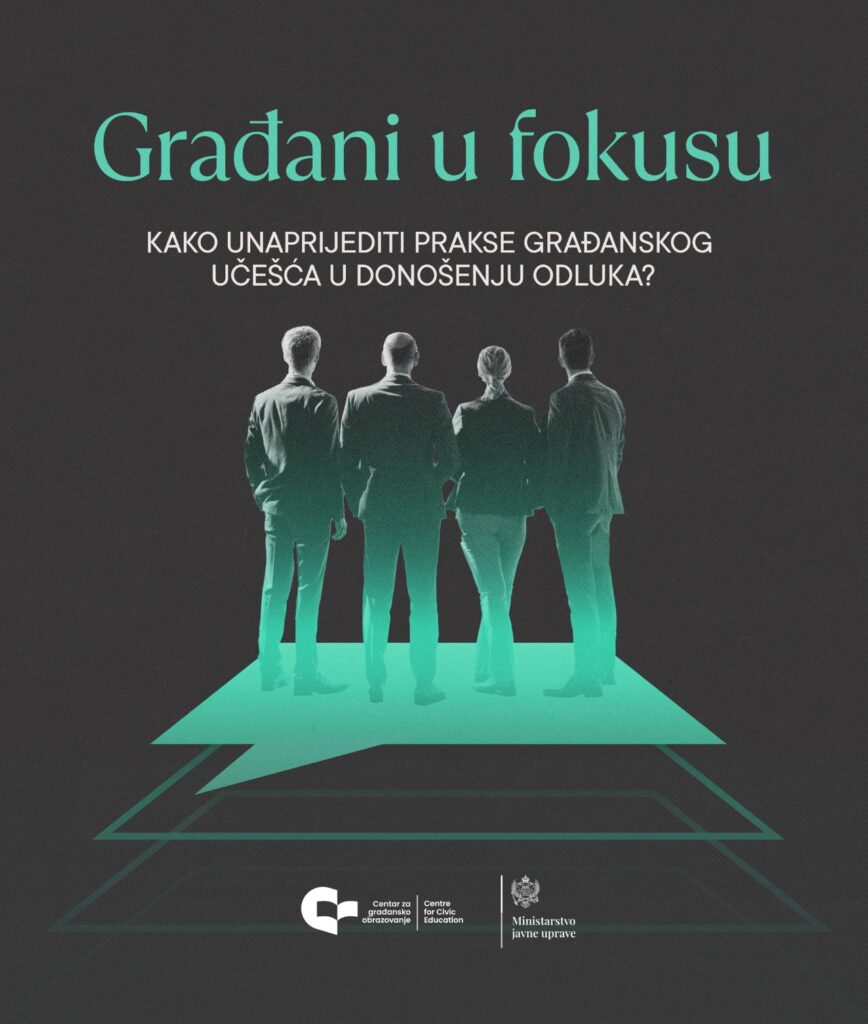The participation of civil society organizations and citizens in public policy shaping and decision-making processes is a part of democratic standards and best practices, which Montenegro aims to achieve through its Europeanization process. The current situation in this area is not good in Montenegro, and in order to improve it, a series of substantive steps need to be taken, as noted in the publication Citizens in Focus – How to Improve Civic Participation Practices in Decision-Making? published by the Centre for Civic Education (CCE).
The authors of this public policy brief on this important, yet neglected, topic are Zorana Marković and Petar Knežević. Their research and analysis of the challenges represent valuable material for all those who want to work on the necessary strengthening of citizen participation in the legislative and strategy-making processes in Montenegro.
“Public consultations and hearings are crucial for democratic decision-making as they enable citizens to actively participate in creating laws and strategies that affect their everyday lives. The legal framework prescribes clear obligations for state institutions, but in practice, a significant gap is identified between what is prescribed and what is actually implemented,” the authors note.
A particular issue is the lack of transparency in publishing information about consultations and public hearings. Available data indicate that in 2022, only three ministries published the mandatory list of documents that would undergo public discussion, and even then, the quality of that list was questionable. In 2023, only one ministry fulfilled this obligation, and in 2024, again, only one ministry remembered to do so.
Furthermore, in 2023, only six consultations were held, with two public calls for consultation published on the Government’s website and four on the e-participation portal, with only two reports published following these consultations. “This number is far below what is expected from state authorities, especially concerning sensitive legal acts. Even though several important laws, such as those related to anti-corruption, were published in 2024, the consultation processes were not adequately conducted,” the authors warn.
The authors also note technical deficiencies of government portals, including both the Government website and the e-government portal, where information is often miscategorized or difficult to access. This reduces the availability and visibility of consultations and public hearings to the broader public, thereby limiting citizen participation.
Bearing in mind the identified abuses of the consultation process and public discussions by issuing calls during holidays and vacation periods, the authors recommend adhering to a calendar of obligations and dynamics, and the publication of public calls for consultation and public debates evenly throughout the year to increase the level of participation.
The recommendations emphasize the need for consistent implementation of the existing legal framework, operationalization of all government websites, increased visibility of public consultation calls during the preparation process and public discussions, tailoring communication plans to specific target groups, and expanding the responsibilities of the bodies conducting the consultation processes. Also, the need for better processing of received comments and suggestions is highlighted, as brief and formal explanations for rejecting proposals discourage further participation. Additionally, strengthening the capacities of public officials for conducting consultations and public discussions, as well as providing training for the proper use of citizen participation platforms.
“Finally, a stronger EU stance on assessing the involvement of civil society in decision-making processes must be insisted upon. Although a series of important laws were adopted in the first half of 2024 with limited or no involvement from civil society and the interested public, Montenegro got the IBAR. Given that this decision is primarily political, it is crucial in the coming period to promote the EU’s position, which is based on respect for regulations and full application of the principles of participatory democracy,” the authors conclude.
The policy brief is part of the activities of the Transparent Bodies – Informed Citizens project, implemented by the CCE with the support of the Ministry of Public Administration.
Miloš Knežević, Development Coordinator

